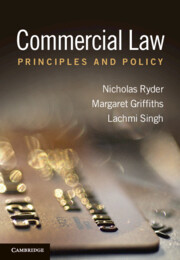Book contents
- Frontmatter
- Contents
- Preface
- List of abbreviations
- Table of Statutory Provisions
- Table of Cases
- Part 1 Agency
- Part 1 Chapter 1 Agency
- Part 1 Chapter 2 The Authority of an Agent
- Part 1 Chapter 3 Relations between a Principal and Agent
- Part 2 Sale of Goods and Services
- Part 3 International Trade and Sales
- Part 4 Tortious Liability for Defective Products
- Part 5 Unfair Commercial Practices
- Part 6 Banking and Finance Law
- Part 7 Consumer Credit
- Bibliography
- Index
- References
Part 1 Chapter 3 - Relations between a Principal and Agent
from Part 1 - Agency
Published online by Cambridge University Press: 05 August 2012
- Frontmatter
- Contents
- Preface
- List of abbreviations
- Table of Statutory Provisions
- Table of Cases
- Part 1 Agency
- Part 1 Chapter 1 Agency
- Part 1 Chapter 2 The Authority of an Agent
- Part 1 Chapter 3 Relations between a Principal and Agent
- Part 2 Sale of Goods and Services
- Part 3 International Trade and Sales
- Part 4 Tortious Liability for Defective Products
- Part 5 Unfair Commercial Practices
- Part 6 Banking and Finance Law
- Part 7 Consumer Credit
- Bibliography
- Index
- References
Summary
Introduction
The purpose of this chapter is to provide an overview of the legal obligations that an agent owes to his principal. These include, for example, the duty to carry out contractual obligations; the duty to obey the principal’s instructions; that the agent must not exceed his authority; the performance of contractual duties; that the agent must exercise due care and skill; the duty not to allow any conflict of interest; the fiduciary duties, not to take a bribe or make a secret profit; and the duty to account. The chapter then outlines the rights of an agent, before moving on to discuss the implications of a disclosed agency, a situation where the third party knows of the existence of the principal, and of an undisclosed agency, a situation where the agent acts for a principal who is not disclosed to the third party. Finally, the chapter deals with termination of the agency.
Duties of an agent
An agent acting for a principal is subject to a wide range of legal obligations, which are imposed either expressly within an agency agreement or impliedly. The duties owed by an agent to his principal have been classified into two very wide categories, those that arise from the contract between the two parties, and those that arise in equity, which has a strong influence over the duties of agents. The duties imposed on an agent were succinctly summarised in Armstrong v. Jackson by McCardie J, who stated:
The position of principal and agent gives rise to particular and onerous duties on the part of the agent, and the high standard of conduct required from him springs from the fiduciary relationship between his employer and himself. His position is confidential. It readily lends itself to abuse. A strict and salutary rule is required to meet the special situation. The rules of English law as they now exist spring from the strictness originally required by Courts of Equity in cases where the fiduciary relationship exists.
- Type
- Chapter
- Information
- Commercial LawPrinciples and Policy, pp. 28 - 58Publisher: Cambridge University PressPrint publication year: 2012



